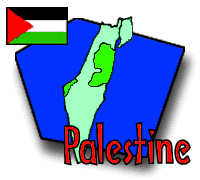
Breakfast: Since we hadn't biked in several days, and we've been eating dinner at a later and later hour, we needed somewhat less food this morning. We've also been so busy that it's been hard to find time for breakfast. So last night we bought some fruit, and that's what we ate on our way to our first meeting, at the United Nations Relief and Works Agency (UNRWA) Department of Information (see the Place of the Day).
Lunch: Falafel and humus sandwich stands are found all over the cities of the Middle East, but rarely will one place serve both. So we grabbed a few sandwiches here and there. In one place, some nice young men ![]() showed us the counter where we could choose our own ingredients!
showed us the counter where we could choose our own ingredients! ![]()
![]() Of course this makes any sandwich taste just that much better.
Of course this makes any sandwich taste just that much better. ![]() In fact, our sandwiches were so good that Anthony tried to get a job there (so he could eat for free) by demonstrating his falafel-making skills.
In fact, our sandwiches were so good that Anthony tried to get a job there (so he could eat for free) by demonstrating his falafel-making skills. ![]()
![]()
Dinner: Tonight, Emad, the Palestinian Coordinator at the Diwan el Shabab, threw a huge "Farewell to BikeAbout BBQ and All Night Dance Party" with a bunch of his close friends. Why did it last all night? Well, our evening presentations and discussions took a while, and then we still had plenty of work to complete, plus, even after we had arrived at the party, the cooks were still preparing the feast. Also, since Thursday evening is the beginning of the weekend for Muslims (the holy day being in Friday), this was going to be a big deal, with lots of food and fun!
Food of the Day: Bananas
Word of the Day: "Freedom"
Person of the Day: Huda Saldo
Place of the Day: United Nations Relief and Works Agency for Palestinian Refugees in the Near East (UNRWA) ![]()
"has been providing education, health, relief and social services to registered Palestine refugees in Jordan, Lebanon, the Syrian Arab Republic, and the West Bank and Gaza Strip for nearly 47 years. Beginning operations in May 1950, its task was to give emergency assistance to the hundreds of thousands of Palestinians displaced by the 1948 Arab-Israeli conflict. The mandate of the Agency, deriving from a resolution adopted by the United Nations General Assembly in December 1949, has been renewed repeatedly, pending a solution to the Palestine question. The seventeenth mandate extends to 30 June 1999.
Today, UNRWA's largest programme is education, taking up 47% of the 1997 budget, followed by health at 17%, and relief and social services at 10%."
Tech Fact of the Day: Communicating by regular mail
|
Group Dispatch, December 11

Questions? Ask Corinne ![]() !
!
 |
 |
 |
 |
 |
|
Itinerary/ Journal |
Discussions |
About Palestine |
eDscape Projects |
Scrapbook |
|
|
|
|
|
|
|
Internet access while in Palestine was provided by PalNet. Internet access while in Gaza was arranged by PalNet's representative in Gaza, Modern Electronic Company (MECo.). | |
Copyright 1997-2004 BikeAbout. All rights reserved.